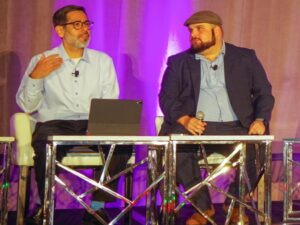What PR managers want in an employee
Most aren’t looking for skills — they want intangible qualities.

With colleges ready to release a wave of bright-eyed and bushy-tailed new graduates onto the job market and more seasoned pros ready to make moves to increase their income and overall happiness, it’s a good time to talk about hiring.
Obviously what any given organization and hiring manager wants is individual. But there are some broad trends we can look at. So we at PR Daily took to LinkedIn to ask PR pros to share the one thing they most look for while they’re hiring.
Almost across the board, managers did not speak to specific skills. It wasn’t an ability to use a media database or a fat rolodex that got them excited. No, these hiring managers want intangible personality traits that can’t be taught — but can be encouraged to blossom.
Here are some responses, lightly edited for style and clarity.
Cross-departmental relationship skills. The razzle and dazzle of the final product is great, but people are at the center of our kind of work. The messaging, marketing, even the metrics: all tie back to people across the entire organization.
—Sheila Fortson, director of Corporate & ESG Communications and INSIGHTS Video Edition host, NCCI
The ability to believe that something can be better, including themselves. I am interested in working with people that can be with the company for more than the job we are filling today. In our business, you cannot just hire superstars. You also need to create and develop them.
—Katie Huang Shin, president of Big Valley Marketing
Energy. Everything else can be taught and learnt but when you find someone with bucket loads of energy, they’re the ones to go for. It powers how hard they work, how much they will be able to deliver and also radiates to clients, so is a must for PR.
—Julia Linehan, founder and CEO of The Digital Voice
Polished writing. Not just in your cover letter and clips, but also in your everyday emails — to your recruiter, to your hiring manager, to anyone else you interviewed with. If you haven’t mastered the art and science of email etiquette, then you haven’t thought hard enough about what PR means.
—Jonathan Rick, ghostwriter
I look for problem solvers — people who can think creatively to get a message across or run a campaign, no matter what hurdles pop up. That includes putting in the work to find and pitch the right journalist for each story, or figuring out how to run a successful event on a shoestring budget when a speaker drops out last minute.
—Mandy Menaker, member of PR Daily Advisory Board
PR candidates at every level should be able to speak to their influences. Not influenc_ers_. We’re talking about influenc_es_. And not the obvious Apple/Nike/Google ones, but specific campaigns from challenger brands that continually open their eyes to the power of the profession and reveal how passionately they pay attention.
—Adam Ritchie, principal, Adam Ritchie Brand Direction
Adaptability, self-awareness, empathy, initiative-taking, strong writing ability (or at least strong potential for it), moral compass, sense of humor.
Bonus for prior political campaign or newsroom experience because it shows versatility, ambition, love of fast pace and “winning” but also the importance of being humble.
—Jeremy Tunis, senior advisor, Public Affairs, Community Relations, Communications at Miramont Behavioral Health
Tenacity. It fosters a culture of continuous improvement, where employees are always striving to do better. Plus, it enables people to take initiative and be proactive in identifying client challenges.
—Carrie Jones, CEO at JPA Health
Curiosity is always at the top of my list. In order to be successful in comms, you need to be deeply motivated to wrap your head around the company from every angle, every vantage point, every nook and cranny. And to be driven enough to ask all the questions, especially the tough ones.
—Allison Hoffman, head of communications at Wheel
I look for candidates who have equal parts ambition/drive as well as low ego. PR hiring managers are always looking for folks who have the basic skill set (strong writing skills, time management, strategic thinking). Those are table stakes. What’s more important, in my view, is to know the person you’re hiring has the drive to want to be successful in their career but also the humility to have a learner’s mindset and to approach the role as if no task is too small. In the fast-paced world of comms and social media, we wear lots of different hats and you need to ensure the people you hire are willing to jump in at any level.
Caty Bleyleben, communications advisor at CMAND
I’m really insistent on hiring people of integrity who will make ethical decisions. I can teach you nearly everything else you need to know to be successful in this work, but I don’t think I can teach you how to act with integrity. I can’t teach you to behave ethically. But I promise you, when you find yourself working with someone who lacks integrity or acts unethically, eventually they will make a decision that damages your reputation or that of your clients.
—John Taylor, founder & principal, White Oak Communications
If I’m interviewing someone for a PR or external comms or social media role and they can’t list the news sites they follow or read each day that is a deal breaker for me. There are other qualifications I look for, but if they are genuinely interested in news and trends, their other attributes don’t matter.
—Sarah Kisko Hersh, executive vice president, Percepture
Initiative. I have no interest in micromanaging anyone, so people who can think are a real bonus. I believe you can teach the skills of PR but that ability to think widely off your own back is a tricky one to educate.
—Francesca Baker, senior public relations consultant, Your Story PR
What would you add to the list?
Allison Carter is executive editor of PR Daily. Follow her on Twitter or LinkedIn.








.1. The smartest one. I used to have classified ad heads like “Editor – Genius Wanted,” and to hire clerical kids from Hunter College High and other schools for the gifted. They could do anything and we didn’t pay next to nothing.
.2. The least likely to sue. Be cautious about candidates who report harassment, discrimination or some other employer flaw on a previous job.
It may be true but may not be.
.3. The most willing to learn. Taking PR Daily courses in crisis management,,
public speaking or whatever show not just willingness but eagerness to learn.
.4. Demonstrated superiority like being the winner of PR Daily or other
awards. Who wouldn’t rather hire a winner?
.5. Candidate questions showing an interest in health PR, travel or whatever the job calls for working on.
.6. No history of activism. Candidates have every right to think and say whatever they want but perhaps you have a right to select a candidate who will fit in well.
.7. Conservative dresser. Again, candidates have “every right” to doll up like a femme fatale or leading man but you have a right to pick someone who doesn’t.
.8. Relative advantages. Even our greatest universities may give a break to candidates whose families may some day make major donations, and it’s no sin for you to notice if a candidate’s family may buy from your employer, or be a judge or political leader who might someday be useful.
.9. Relative perils. Beware the otherwise attractive candidate whose parent or other relative is a litigation lawyer.
10. Avoid a candidate your boss or CEO will hate even if that hatred may be unlawful. It’s nice to try changing the world for the better but perhaps not so much if that leads to your changing jobs.
Obviously the above opinions are mine not not this newsletter’s.
.11. Arrogance. Candidates can sometimes judge themselves better than we can judge them. Self esteem even when excessive often comes from a history of school and job success.
.12. Freedom from being angry at the world or super-moral. A victim mentality may come from blaming others for not personally achieving more.
.13. Recognition that personal and company success means not just making a lot of money but doing good.
.14. Honesty. Succeeding the right way may be harder at first but way more profitable over time. Success is more easily earned than gained by
deception.
.15. Lovers and losers. Who a candidate admires and dislikes most may
forecast whether you’ll admire or dislike the candidate if hired.
.16. It may be especially revealing to ask “which groups do you think deserve a lot more justice?” The answer may mirror what you would say OR it could reveal a latent hatred of free enterprise, business and even PR.